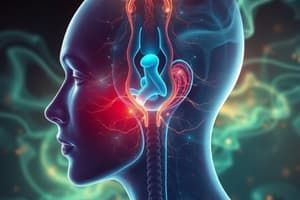Podcast
Questions and Answers
What effect does Thyroid Hormone (TH) primarily have on target tissues?
What effect does Thyroid Hormone (TH) primarily have on target tissues?
- Lowers heart rate and contraction strength
- Promotes fat storage
- Increases sensitivity to catecholamines (correct)
- Decreases oxygen consumption
Which hormone is NOT involved in regulating calcium metabolism?
Which hormone is NOT involved in regulating calcium metabolism?
- Parathyroid hormone (PTH)
- Estrogen (correct)
- Vitamin D3
- Calcitonin
What is a prominent symptom of hyperthyroidism?
What is a prominent symptom of hyperthyroidism?
- Prominent eyes (correct)
- Moon face
- Curved legs
- Muscle spasms
Which of the following is a consequence of increased cortisol levels?
Which of the following is a consequence of increased cortisol levels?
What is the primary action of estrogen regarding bone health?
What is the primary action of estrogen regarding bone health?
Which hormone is primarily responsible for increasing the size and number of cells in soft tissues and skeleton?
Which hormone is primarily responsible for increasing the size and number of cells in soft tissues and skeleton?
What condition results from the hyposecretion of Growth Hormone?
What condition results from the hyposecretion of Growth Hormone?
What role does Thyroid Hormone play in relation to Growth Hormone?
What role does Thyroid Hormone play in relation to Growth Hormone?
During which period is Thyroid Hormone absolutely required for the normal development of the CNS in the fetus?
During which period is Thyroid Hormone absolutely required for the normal development of the CNS in the fetus?
What is the effect of Cortisol in terms of growth?
What is the effect of Cortisol in terms of growth?
What are the properties of hormones based on their description?
What are the properties of hormones based on their description?
What physiological response is NOT directly influenced by Growth Hormone?
What physiological response is NOT directly influenced by Growth Hormone?
What happens to the number of Growth Hormone receptors with the presence of Thyroid Hormone?
What happens to the number of Growth Hormone receptors with the presence of Thyroid Hormone?
What condition is characterized by congenital hypothyroidism in children leading to short stature and less mental development?
What condition is characterized by congenital hypothyroidism in children leading to short stature and less mental development?
Which hormone plays a key role in the growth spurt at puberty?
Which hormone plays a key role in the growth spurt at puberty?
What effect does high cortisol levels have on growth?
What effect does high cortisol levels have on growth?
Which type of diabetes is characterized by almost no insulin secretion?
Which type of diabetes is characterized by almost no insulin secretion?
What is a common treatment for Type 1 Diabetes?
What is a common treatment for Type 1 Diabetes?
Which statement is true regarding Type 2 Diabetes?
Which statement is true regarding Type 2 Diabetes?
What direct effect does thyroid hormone (TH) have on the body?
What direct effect does thyroid hormone (TH) have on the body?
What is the basic defect in Type 2 Diabetes?
What is the basic defect in Type 2 Diabetes?
Flashcards are hidden until you start studying
Study Notes
Endocrinology
- Endocrinology is the study of hormones and their effects on the body.
- Hormones are chemical messengers secreted by endocrine glands.
- Endocrine glands are ductless glands that secrete hormones directly into the bloodstream.
Endocrine Control of Growth
- Growth is the process of increasing in size and number of cells.
- Growth involves lengthening the skeleton, specifically the long bones and vertebral column.
- Growth is also important for the increase in size of soft tissues, like internal organs.
- Hormones involved in growth include:
- Growth hormone (GH): secreted by the pituitary gland. It causes an increase in the number and size of cells, particularly due to protein synthesis.
- Thyroid hormone: secreted by the thyroid gland. It increases the number of receptors for growth hormone, ensuring its effectiveness.
- Insulin: secreted by the pancreas. It helps regulate blood sugar levels and promotes growth.
- Sex hormones: secreted by the testes (testosterone) and ovaries (estrogen and progesterone). They play a crucial role in the growth spurt during puberty.
- Cortisol: secreted by the adrenal glands. It is an anti-growth hormone, and high levels can decrease growth.
Growth Hormone Effects
- Growth hormone hyposecretion (deficiency): results in dwarfism.
- Growth hormone hypersecretion (excess): results in gigantism.
Role of Thyroid Hormone in Growth
- Thyroid hormone is essential for normal brain development.
- It is crucial for the development of the central nervous system (CNS) from 28 weeks of pregnancy to one week postpartum.
- Thyroid hormone increases the sensitivity of tissues to growth hormone, enhancing growth.
- Hypothyroidism: leads to slowed growth and developmental issues.
- Cretinism: a condition where a hypothyroid child has reduced growth and intellectual impairment.
- Myxedema: a condition where a hypothyroid adult experiences swelling of the face.
Role of Sex Hormones in Growth
- Sex hormones, such as estrogen, progesterone, and testosterone, are responsible for the growth spurt during puberty.
- They stimulate the growth of long bones, but also lead to the closure of epiphyseal plates (growth plates), ultimately stopping bone growth.
Role of Insulin and Cortisol in Growth
- Insulin plays a crucial role in growth by regulating blood sugar levels and promoting protein synthesis.
- High cortisol levels inhibit growth.
- Cortisol causes protein breakdown and hampers the secretion of growth hormone.
- Stress can lead to increased cortisol levels, potentially hindering growth in children.
Endocrine Control of Fuel Metabolism
- Hormones regulate fuel metabolism by controlling the breakdown of carbohydrates, fats, and proteins for energy.
- They influence blood sugar levels and regulate the storage and use of energy reserves.
Hormones involved in Fuel Metabolism
- Insulin: regulates blood glucose levels by promoting glucose uptake and storage in cells, lowering blood sugar.
- Glucagon: increases blood glucose levels by promoting the breakdown of stored glycogen in the liver.
- Thyroid hormone: increases basal metabolic rate, affecting energy expenditure and body temperature.
- Cortisol: promotes the breakdown of proteins and stored fat for energy, increasing blood glucose levels.
- Epinephrine and norepinephrine (catecholamines): increase blood glucose levels by stimulating the breakdown of glycogen and promoting the release of fatty acids.
Diabetes Mellitus
- It is a metabolic disorder characterized by hyperglycemia (high blood sugar).
- Two main types of diabetes:
- Type 1 Diabetes: characterized by the destruction of insulin-producing beta cells in the pancreas. People with type 1 diabetes require insulin injections to manage their blood sugar.
- Type 2 Diabetes: characterized by insulin resistance, where cells don't respond properly to insulin. This can be managed through diet, exercise, weight loss, and potentially oral medications.
Endocrine Control of Calcium Metabolism
- Calcium metabolism involves the exchange of calcium between the extracellular fluid (ECF) and:
- Bone: stores calcium.
- Kidneys: regulate calcium excretion in urine.
- Intestine: absorbs calcium from food.
Hormones involved in Calcium Metabolism
- Parathyroid hormone (PTH): increases blood calcium levels by stimulating bone resorption, calcium reabsorption in the kidneys, and vitamin D activation.
- Calcitonin: lowers blood calcium levels by inhibiting bone resorption.
- Vitamin D3: enhances calcium absorption in the intestines.
Calcium Deficiency
- Can lead to musculoskeletal problems and neurological disorders.
- Rickets: a condition in children characterized by weak and soft bones due to vitamin D deficiency, leading to bone deformities.
- Tetany: a condition characterized by muscle spasms and cramps due to low calcium levels.
Stress Hormones
- Stress hormones prepare the body for "fight or flight" responses during stressful situations.
- Cortisol: the primary stress hormone, increases blood glucose levels, suppresses the immune system, and affects various metabolic processes.
- Epinephrine (adrenaline): increases heart rate, blood pressure, and blood glucose levels.
- Norepinephrine (noradrenaline): increases alertness and focus, and supports the actions of epinephrine.
Cortisol Effects
- Increased levels of cortisol can lead to:
- High blood pressure
- Elevated blood sugar levels
- Increased respiratory rate and heart rate
- Immune system suppression
Studying That Suits You
Use AI to generate personalized quizzes and flashcards to suit your learning preferences.




